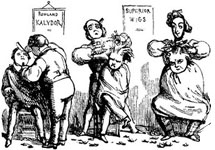
The Priesthood Is Not Just a Job
THE CHURCH IS NOT JUST AN ORGANIZATION
As I looked over the plans for a new church one day recently, I noticed that the presidential chair, from which the priest presides over the liturgy, was located in the midst of the assembly. While it was distinct from the other seats in form, it did not have any distinction of place. Instinctively, I was bothered by the arrangement, though I couldn’t immediately put my finger on what bothered me. Upon reflection, it seemed odd, from a communications point of view, to place someone whose role it is to interact verbally and visually with the rest of the assembly where he cannot be seen by a significant number of the people. Moreover, something was “communicated” by the arrangement which is symptomatic of a more serious problem: an overly functional understanding of the Sacraments — particularly the Sacrament of Holy Orders — that has taken hold in the Catholic Church in recent years.
We often hear people, particularly laypeople, say, “We are the Church.” There is certainly truth in what they say, and, although the clergy are members of the Church too, the phrase is more often than not a corrective to an overly clericalized understanding of the Church that is part of our history. Yet what is sometimes implied is, “We make ourselves the Church,” and that is clearly an error, since it is Christ who makes us the Church by calling us to be members of His Body by a completely gratuitous action. Yes, we, both clergy and laity, are the ones who “run” the Church, who “make the Church happen.” However, we must be careful that we do not forget our place. It is Christ Jesus who is Lord, and it is God alone who, through Christ, with Him and in Him, in the unity of the Holy Spirit, makes us the Church. Our worship is designed to remind us of that fact and humbly to thank God for giving us the free gift of grace, so that we can then go out and use that gift — building on our own natural gifts — to help the Kingdom come.
The role of the ordained priest in the celebration of the Eucharist is more than functional. It involves more than saying the proper words at the proper time over the proper elements. The priest not only “performs” the Sacrament, he simultaneously is a Sacrament — a living, visible, and audible sign of Christ interacting with the Church. He is a living reminder that it is not the assembly that makes itself the Church, but that it is Christ, made visible sacramentally in the “icon” of the priest, who calls the Church into being in a unique way in the celebration of the Eucharist (see Decree on the Ministry and Life of Priests, #6). So, to place the presiding priest in a location where he is seen as the first among equals is to neglect the role he plays as Sacrament of Christ Himself, present to and interacting with His beloved, the Church (see Constitution on the Sacred Liturgy, #7, #33). Christ has intimately united Himself to us, but not as a first among equals. He is the head, and we are the members.
You May Also Enjoy
While he lived, from first novel to last, he enjoyed an immense audience, an international audience drawn from all classes, including the royal family.
The Natural Law in the Postmodern Milieu... Standing Firm... Anti-Franciscan Bias?... In Defense of "On This Day"... Sir Isaac the Heretic... A Shrewd Trade-Off... The Anchor of Hope
Modern man, reserved and calculating, must restore true heroism, true spontaneity to his life, Brandsma taught, so that love, sacrifice, and courage may be allowed to perfect our human nature.

